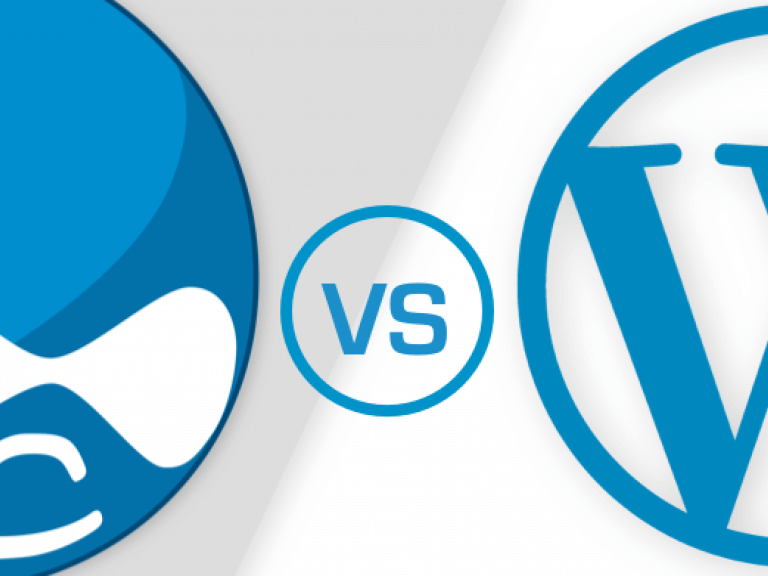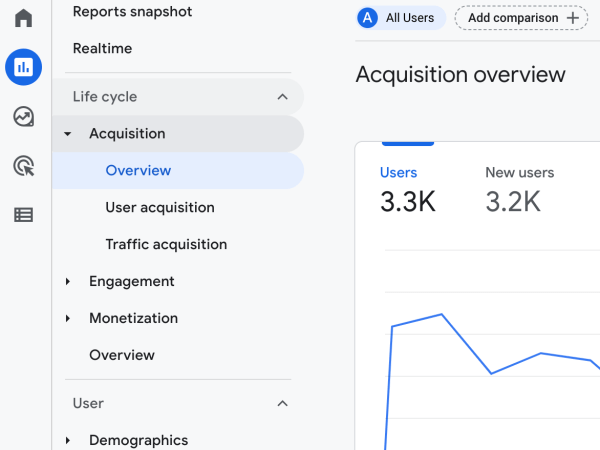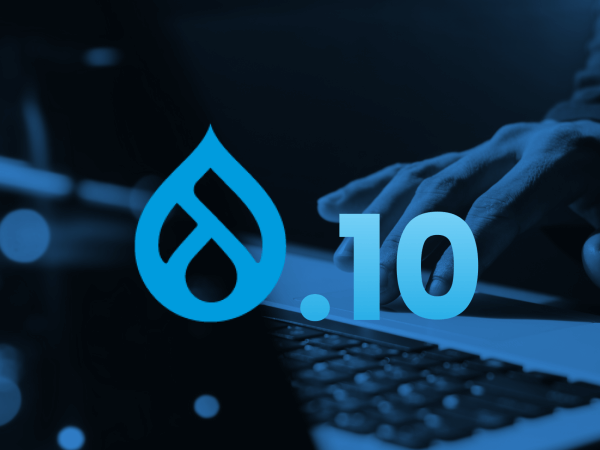What’s the difference between Drupal and WordPress? Why would a business choose one over the other? Once you’ve seen one Content Management System (CMS), you’ve seen them all, right? These are some of the most common questions we hear from prospects and clients. Unfortunately, there is not a winner-takes-all answer here. Sometimes Drupal is a better fit for the project and sometimes WordPress is a better fit.
Drupal vs WordPress: Which is the Best Content Management System for Your Project?
When it comes to choosing a content management system (CMS) for your website or application, two of the most popular options are Drupal and WordPress. Both have a long history and a large user base, and they have many features in common. However, they also have some important differences that can make one or the other a better choice for your particular needs. In this article, we will compare Drupal vs WordPress to help you decide which one is the best fit for your project.
We often talk about the purposeful web: sites and applications that “do something,” not just “say something.” At the highest and simplest level, this is also a good way to differentiate WordPress (created for sites that say something) and Drupal (created for sites that do something).
While there are no absolutes when using one platform over the other, below we cover what each delivers best, and flavor it with how the attributes achieve the purposeful web.
Drupal
Drupal (and Drupal 8, in particular) is a powerful platform which allows you to manage customized and flexible content, delivering it via a variety of channels. You can use it as a traditional CMS to display content on your website or you can use it as a user-friendly administration area to manage content for native iOS/Android apps, point-of-sale systems or business process applications. Apps and sites can range from informational content to material with a deep level of interactivity.
The power of Drupal lies within its flexible content architecture. You can quickly create customized types of content which allow for easy administration and contextual display. For example, let’s assume you want to display a staff member’s profile. You can create a form which captures that information in, say, a dozen different fields and then create multiple display modes, depending on if the displaying page is best suited for a teaser view, a full-page view, an iOS application, an iWatch display, etc.
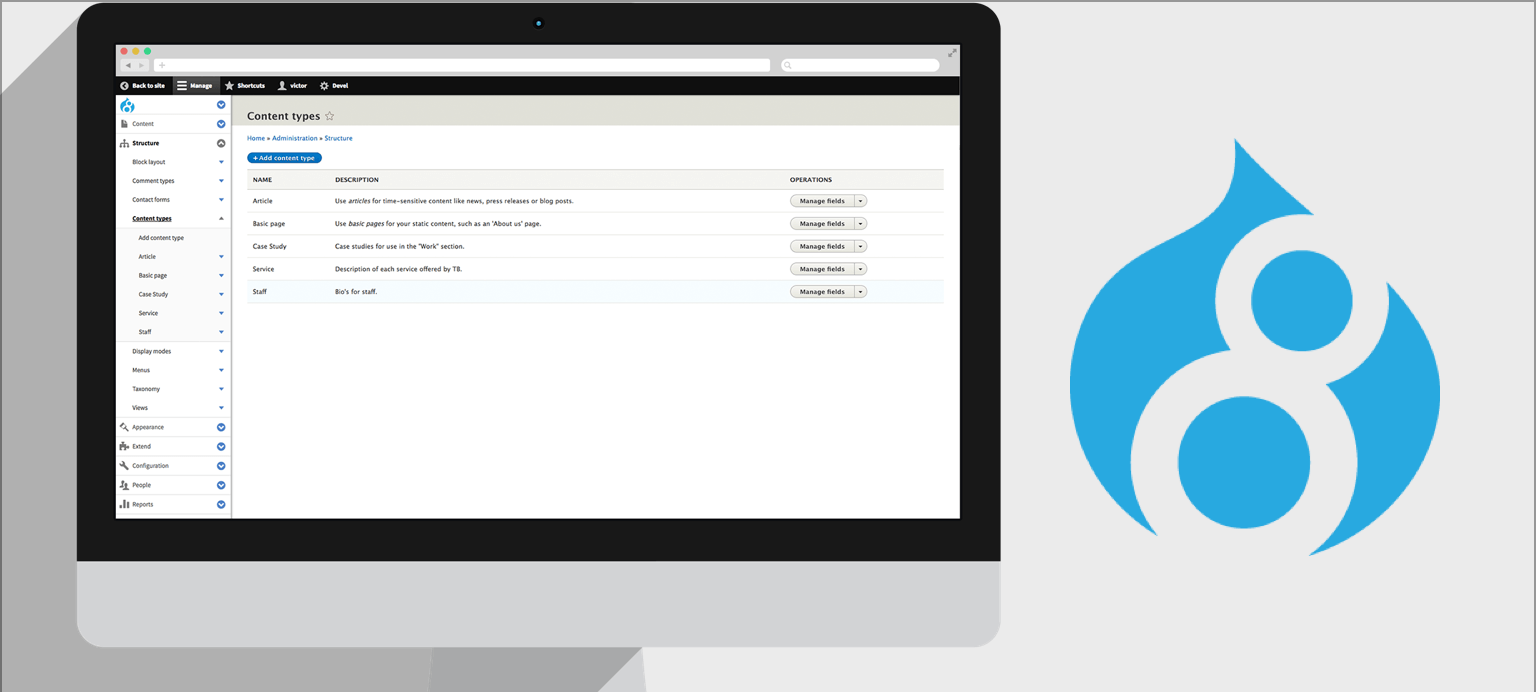
WordPress
WordPress is built around a wonderful idea: Make the web easy. It touts its famous five-minute installation process, offers thousands of pre-built, great looking themes for around $50 each and a simple administration interface.
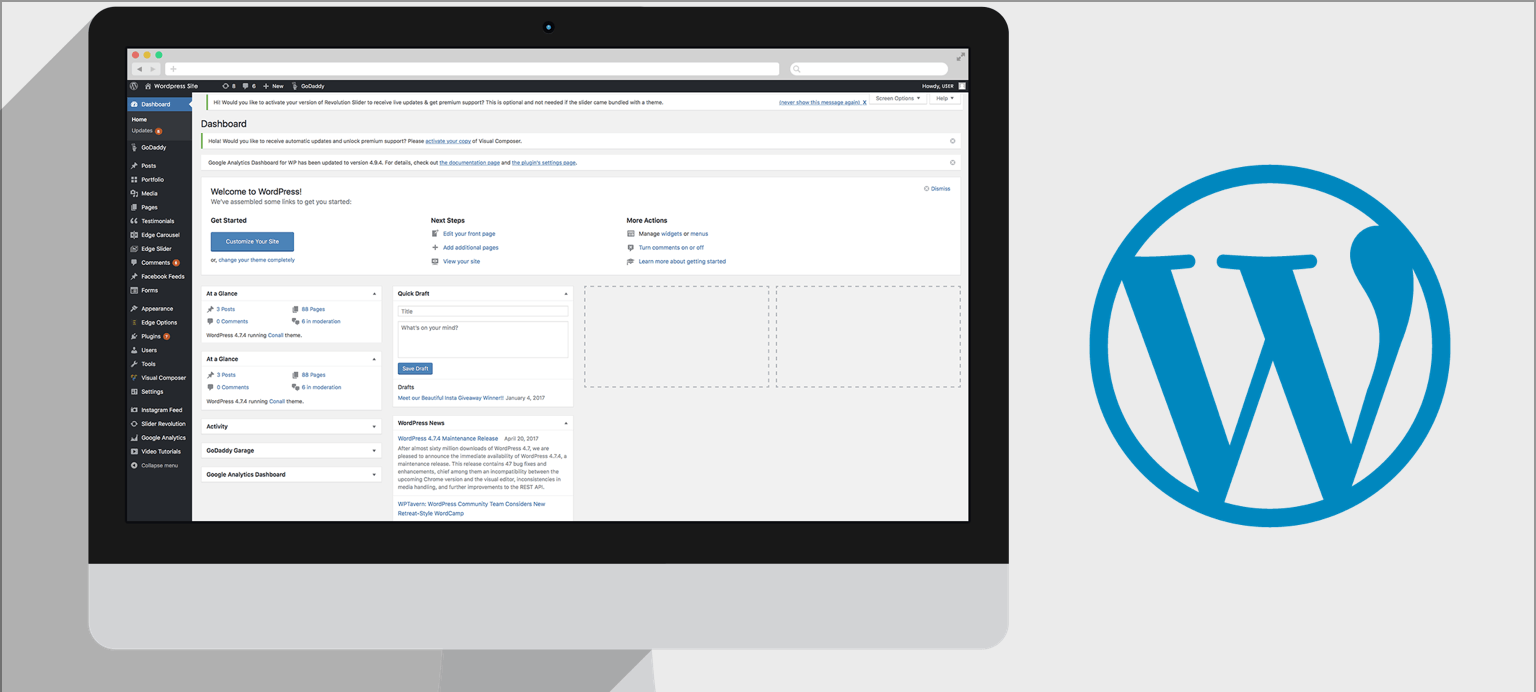
This simplicity is achieved because, generally, WordPress sites are built on known, traditional website elements. For example, there will be ‘pages’ (e.g. “about us” or “privacy policy”) consisting of title, body and a featured image field. As another example, there will be ‘posts’ (e.g. blog articles) consisting of the same fields as pages, but also allow you to tag them with keywords.
These known elements allow for generic themes to be built, and these themes work well for many cases. At approximately $50 each, the economy of scale enables developers to generate revenue and pump out websites which look different but all have the same, basic functionality. This off-the-shelf solution, generally, works well for sites that are informational-only (web sites that ‘say something’) and which do not require any significant user engagement or interactivity. If site requirements are covered in the ‘pages’ and ‘posts’ content types referenced above (and the business or user goals of the site are unlikely to evolve into anything more complex in the future) then WordPress is a good fit.
The Main Attributes of Drupal vs WordPress
The list below, while greatly simplifying the topic, offers guidance on the attributes of the two platforms, and when one is a better choice than the other.
WordPress
- Simple, easy-to-manage website templates.
- Ideal for brochure-style, informational sites.
- Simple-to-use administration interface.
- Great out-of-the-box media library management.
- Less of a learning curve for developers.
- Cheaper to build and maintain.
- Thousands of “off-the-shelf” themes to quickly spin up a good-looking site.
Drupal
- For more complex sites or apps that need to go “off-the-page” to deliver engagement.
- Customizable to the criteria of the project and business.
- Scalable from simple websites to the most trafficked sites on the web, such as www.weather.com.
- Allows more granular user access control to enable custom workflows.
- Built-in caching for higher performance and faster page loads.
- Significantly reduces security vulnerabilities.
- Drupal sites can realign, scale, and integrate as the business needs change without hitting limitations.
Features and Functionality of Drupal vs WordPress
One of the main differences between Drupal and WordPress is the range and depth of features and functionality they offer. Drupal is a more powerful and flexible CMS that can handle a wide variety of use cases and customizations. It is often used for large, complex websites with a lot of content and many contributors. It has a modular architecture that allows developers to add or remove features as needed, and it has a robust permissions system that allows administrators to control who can do what on the site.
WordPress, on the other hand, is designed to be more user-friendly and accessible to non-technical users. It has a large selection of pre-designed themes and plugins that allow users to quickly and easily customize their site's appearance and functionality. While it can handle a wide range of use cases, it may not be as well-suited for large, complex websites as Drupal.
Drupal vs WordPress Ease of Use
Historically one of the main reasons people choose WordPress over Drupal was because it is generally easier to use. WordPress had a much simpler and more intuitive user interface, and it was more forgiving of mistakes. It also has a larger community of users and developers, which means that there is more support and documentation available for those who are new to the platform. However, it also means that the barrier of entry is much lower than it is with Drupal and so the quality of agencies varies massively.
Drupal, on the other hand, is more geared toward developers and technical users. It has a steeper learning curve and may require more time and effort to set up and maintain. However, once you get the hang of it, Drupal can be very powerful and flexible and is often the platform of choice for companies looking to create ambitious web applications which provide extensive value for their organizations.
Drupal vs WordPress Security
Both Drupal and WordPress have a good track record when it comes to security. Both platforms have regular security updates and have active communities of developers working to identify and fix vulnerabilities. WordPress is used for a wider range of websites, including smaller, personal blogs, which means there are more sites using WordPress and so they get hacked more often. Drupal is not as easy to update as WordPress and so if you are managing your site in-house and don't have the technical skills needed then that is where you can run into trouble. Having a quality Drupal development company as your partner to manage and maintain your site or application should be the first thing you do.
Drupal vs WordPress SEO
Both Drupal and WordPress are SEO-friendly and have a number of features and plugins that can help improve the search engine ranking of your website. However, Drupal may have an edge in this regard because it is more flexible and customizable. It allows developers to fine-tune the structure and content of a website in ways that may be more attractive to search engines. WordPress, on the other hand, is more limited in this regard, although it does have a number of good SEO plugins that can help and so a "point and click" solution for less technical teams is easily within reach.
Summary
Although the Drupal vs WordPress question is a common one, we feel the launch of Drupal 8 enables us to finally draw a line through any debate. They are both great tools but work in very different spaces. The idea of Drupal vs. WordPress competing belongs in the past. There is a distinction and boundary between these platforms and the needs they fulfill are drifting further and further apart.
WordPress currently has a stranglehold on the traditional brochure website arena but alternatives such as Squarespace, Shopify, and Wix are becoming popular alternatives. These alternatives to WordPress deliver the same benefits: great visuals, easy to use, and quickly solve simple problems. The less complex internet presence has myriad options and we are at a point where we can say Drupal may not be one of those options. Drupal does not try to compete in that space. The unique selling points of Drupal belong in a different section of digital implementations – not “better” but certainly different.
As the internet moves away from the idea of a traditional “website” (which WordPress delivers with aplomb) and surges forward to delivering the purposeful web, we feel Drupal is better positioned for the long term and is the better option for organizations looking to implement an ambitious digital strategy. Drupal weaves seamlessly through websites, native applications, wearables, point-of-sale devices, social media and third-party integrations. Drupal does not try to be all things to all people, but it views its place on the internet very differently to WordPress. It focuses on delivering digital solutions for businesses which need more than a traditional website. Drupal is not for everyone, but then again, neither is a traditional website.
In summary, Drupal and WordPress are both excellent CMS options, and the best one for you will depend on your specific needs and goals. If you are building a large, complex website with a lot of content and many contributors, Drupal may be the better choice. If you are building a smaller, simpler website or blog, or if you are not a technical user, WordPress may be the better option. Ultimately, the decision will depend on your particular project and what you are trying to achieve.
Remember to start with the question: Does your website need to “do something” or just “say something”? The answer to that will help define the path that your web development should follow.
- Log in to post comments
